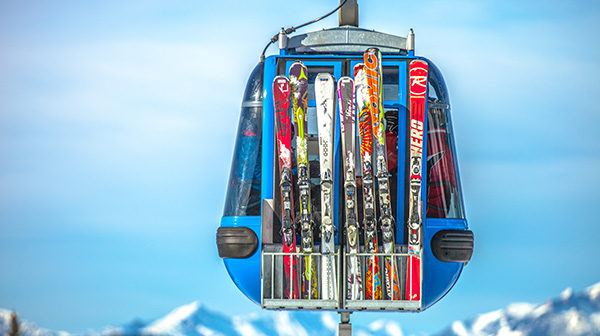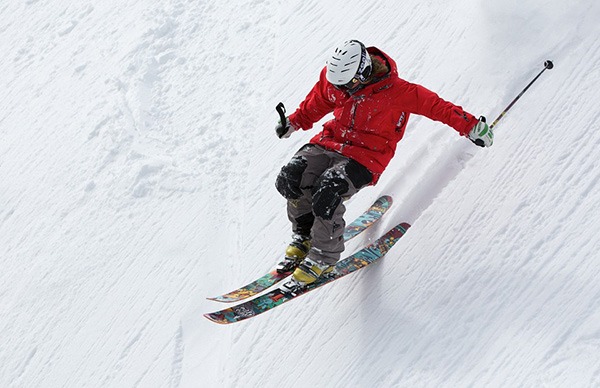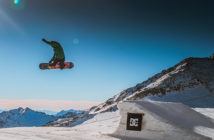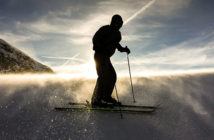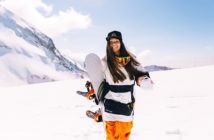Looking for the best all mountain skis of 2020?
Don’t worry, we’ve got you covered.
We’re passionate about skiing and, in our humble opinion, a fantastic pair of all mountain skis is one of the best investments you can make in this sport.
It’s all about versatility with these bad boys. Need skis that can carve tight turns on groomers? Get yourself a pair of all-mountains. Also fancy thrashing it out it deep powder? No need to buy yourself a pair of powder skis if you’ve got a great pair of all-mountains!
Whether you’re a beginner or an expert skier, the best all mountain skis will serve you well on the slopes.
We’ve compiled this huge buying guide for anyone looking to invest in a pair. We’ve got a list of the top products on the market, as well as all the things you should know before you hand over your credit card.
Before we take a deep dive, here’s a sneak peak at 5 of our favorite all mountain skis right now:
| Waist | 100 | 95 | 98 | 100 | 93 |
| Level | Advanced ++ | Advanced ++ | Advanced ++ | Advanced ++ | Strong Intermediate ++ |
| Pro | Insanely versatile, stable, fun | Excellent carver, versatile | Versatility, great charger | Versatile, fun, great in powder | Versatile, stable, playful, great edge hold |
| Con | Needs power | Needs lots of input from skier | Nothing! | Could be damper | Nothing! |
And let’s take it away…
Contents
- 1 What are All Mountain Skis?
- 2 Types of All Mountain Skis
- 3 Things to Consider Before You Buy All Mountain Skis
- 4 Best All Mountain Skis 2020
- 4.1 Elan Ripstick 106
- 4.2 Volkl Kendo
- 4.3 Volkl Mantra
- 4.4 Rossignol Smash 7 with XPress 11 Bindings
- 4.5 Fischer Pro Mtn 95 Ti
- 4.6 Blizzard Bonafide
- 4.7 Faction Prodigy 2.0
- 4.8 Salomon QST 99
- 4.9 Nordica Navigator 85
- 4.10 Head Kore 93
- 4.11 Atomic Vantage 100 CTI
- 4.12 Nordica Enforcer 93
- 4.13 K2 Pinnacle 95
- 4.14 Rossignol Experience 88 HD
- 4.15 Line Sick Day 88
- 4.16 Dynastar Legend X96
- 4.17 Kastle FX95 HP
What are All Mountain Skis?
As the name suggests, all mountain skis are exactly that: skis that can be used on all parts of the mountain.
On-piste or off-piste, bunny slope or double black diamond — these skis can do them all.
Of course, it’s not quite as simple as that in reality.
Not all all mountain skis are made equal. Some are much better on powder, others on hardpack. Some are excellent for carving turns whereas others are perfect for moguls.
It’s not quite so simple as just picking any old pair and expecting them to work perfectly on all different terrains.
There are a huge number of all mountain skis on the market, all with different pros and cons to be aware of. Don’t worry though — our list below of the best ones will spell out exactly which are best for you and the conditions you most often ski in.
Another thing to be aware of is that there is no global standard for all mountain skis. What one manufacturer creates may be quite different to the all mountain ski of another one.
Generally speaking, however, you can expect most to sport the following features:
- Waist of between 80 to 105 mm underfoot
- Designed for both carving on groomers and floating in fresh snow
- Can be used at least adequately on all types of mountain terrain, at all speeds, in all types of snow conditions
- Traditional camber profile with some rocker — camber is where the ski curves upwards under the binding, leaving a small gap between the ski and the snow. This allows for additional grip and easy handling. Rocker is where the tip and/or tail curves upwards to some degree, helping to initiate turns in softer snow
All Mountain vs Powder Skis
One of the questions we hear time and again is from people wondering whether they should buy a pair of all mountain skis or powder skis instead.
The answer to this is entirely up to you. It basically boils down to: what terrain and snow conditions do you mostly ski in?
Here’s what we think.
You should buy all mountain skis if…
- You’re primarily looking for versatile skis, rather than specialist performance ones
- You want skis that are just as good on groomed slopes as on powder
- You’re a beginner or intermediate skier
- You ski in lots of different terrains and ski conditions
- You travel a lot to ski
You should buy powder skis if…
- You want high performance skis for powder and off piste skiing
- You already have a pair of skis for use on groomed slopes
- You’re an advanced skier that can handle powder skis on groomed slopes
- You spend most of your time in powder conditions
If you’re set on buying a pair of all mountain skis but you know you’ll be spending quite a lot of time on powder, we’d suggest opting for a pair of all mountain wide skis instead.
These are slightly better for floating in powder and offer a higher performance than standard all mountain skis.
Plus, they’re just as good on groomed slopes.
Here’s a quick summary of all mountain vs powder skis:
| All-Mountain Skis | Powder Skis | |
|---|---|---|
| Best For... | Versatility all over the mountain | High performance in powder terrain |
| Waist | 80-105 mm | 105 mm + |
| Performance on Powder | Average | Excellent |
| Performance on Groomers | Excellent | Poor to Average (only if skier experienced enough) |
| Experience Level | Beginner to Advanced | Advanced |
Types of All Mountain Skis
Now that you’ve decided a pair of all mountain skis is right for you, you’ll need to decide what type you want to go for.
We told you it wasn’t as simple as simply choosing a pair in a catalogue! 😅
When we say ‘type’, we essentially mean construction.
There are 3 major ski types to choose between:
Cap Skis
Cap skis are probably the most popular type of all mountain ski, and they also benefit from being the lightest, fastest and (usually) cheapest on the market.
They’re also the easiest to turn on groomed slopes.
The core of the ski (usually made of wood, foam or fiberglass) is fully encased in a protective plastic topsheet.
Sidewall/Sandwich Skis
Sidewalls are another super popular type of ski.
These are generally heavier than cap skis, which means that while they’re harder to turn, they do provide extra stability and grip.
They’re subsequently much more durable than most cap skis.
Sidewall skis are constructed from compressed layers of different materials above and below the core. These layers often comprise fiberglass, steel or plastic.
You’ll be able to spot a sidewall ski because of the ‘walls’ on the side that allow you to ski and grip into the snow.
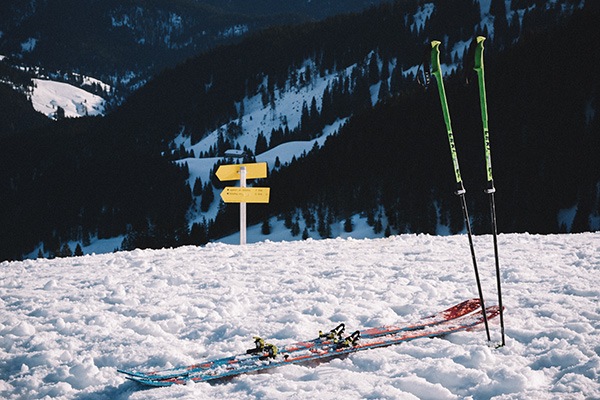
Hybrid Skis
As you can probably guess, hybrid skis are a mixture of cap and sidewall skis.
The tip and tails of the ski are constructed like a cap ski, but you’ll find walls along the length of the skis under the binding for additional grip.
Hybrid skis are pretty cool: they’re still light and fast like cap skis, but offer a little extra stability and grip like sidewalls.
Things to Consider Before You Buy All Mountain Skis
You probably already have a few conditions in mind before you buy your skis — things like budget, gender, height etc.
But it’s always best to go into the ski shopping process as well informed as you can possibly be.
Only then can you be sure that you’re really taking home the best all mountain skis for you as an individual.
Here are the things you need to think about before you buy.
Terrain
Perhaps the number one thing you need to be aware of — and certainly the first thing any ski shop assistant will ask you — is what type of terrain and snow conditions you’ll mostly be skiing in.
This will determine what waist width is the most appropriate for you, as well as narrow down the ski selection.
For instance, if you usually ski on hardpack snow, you’ll likely be best suited to a waist width of between 80-95 mm underfoot.
If you’re generally more of a softer snow skier (we’re looking at you, Colorado), wider is better — 95 to 105 mm.
Of course, if you’re anything like us, you may like to travel a lot and explore plenty of different terrains and snow conditions. What then?
Don’t panic — the beauty of all mountain skis is their ability to take on all different environments.
All this means is that you need to focus on the most versatile of skis.
As we’ve mentioned before, some are much better suited to one terrain or the other — whereas some are truly versatile.
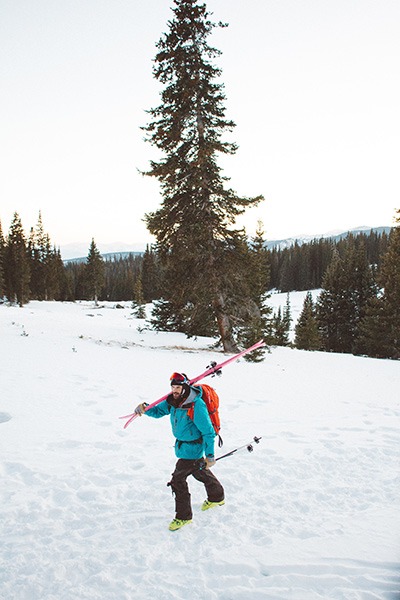
Flex
Of course, it’s not only waist size that you need to consider.
Flex is important too. Particularly if you’re skiing moguls.
If you like to take on lots of bumps down the trails, you’ll be well aware of the impact of shock absorption. The more flexible the skis, the more absorbing they are of shock.
You can test the flex in a pair of skis with a simple test: press down on the center of the ski to see how much it bends.
The more it bends, the more flex it has.
Sidecut
Sidecut is another important feature. Particularly if you like trails with plenty of trees and other obstacles.
Tied to waist, sidecut is defined by the proportion of the skis — essentially, how curvy or straight the ski is.
You’ll need to consider the width of the tip, waist and tail to accurately gauge this. Helpfully, all retailers provide this info in the following format: 125/80/110, for instance.
The bigger the sidecut — the curvier the ski — the easier it is to turn.
On the other hand, a smaller sidecut — found on straighter skis — are better equipped to float when off piste.
Rocker
Rockered tips and tails are when the tip and tails curve upwards when the ski is laid flat.
Rocker helps for initiating turns when you’re skiing in powder, but can detract from stability when you’re on a groomed trail.
If stability is important to you, look for all mountain skis with just a rockered tip, rather than the tail as well.
Here’s a great video explaining about the importance of rocker on all mountain skis:
Your Experience Level
Speaking more generally now, you should definitely take into account your own skiing experience before you buy all mountain skis.
We all know that skiing is a dangerous sport. You’ll be putting yourself (as well as others on the slope around you) in danger if you take on a pair that are designed for high performance, advanced skiers without the experience to back it up.
Look for skis that not only fit your experience level, but also give you some room to grow and improve with them.
Most retailers will advise on recommend experience for each ski — beginner to intermediate, for instance, or intermediate to advanced.
If you’re a brand new beginner at skiing, it may be worth garnering a little experience first before you slap down a not insignificant amount of money for the best all mountain skis.
Once you’ve spent some time on the slopes with hired skis, you’ll be able to find out what works for you and what you value most in a ski.
Without this experience, you’ll be buying blind.
There’s not much point in buying a pair of skis that are expertly designed for moguls if you soon find out that you’re not remotely interested in that type of skiing.
Return Policy
Before you buy your skis, check what the store’s return policy is.
This is especially important for online shopping.
We’ve bought many a pair of skis online and definitely recommend it as a way to scour through a huge selection of skis, but there’s no doubt that there’s a little extra risk involved when you can’t test it out in person before you buy.
There’s nothing worse than eagerly awaiting your newly purchased all mountain skis to arrive, only to find out that there’s not enough flex in them for your tastes.
Most online stores will have a return policy where you can test them out at home and return or exchange them if they’re not perfect.
You could also head into a store to do some in-person window shopping, note down what skis you want to buy and then head online to find the best deals on those skis when you get home.
A bit naughty but we won’t tell anyone 😉
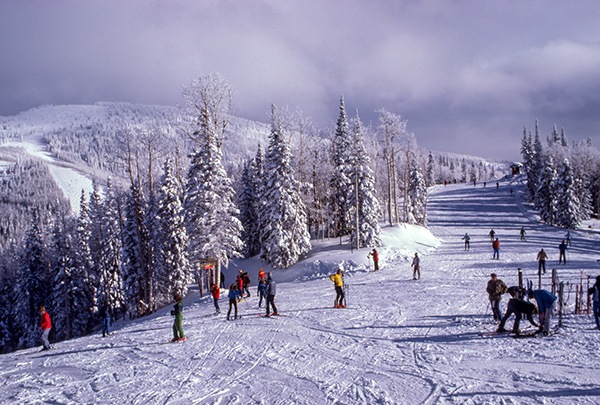
Budget
Holding the entire ski-buying operation together is your budget.
It’s not much good if you’re looking for the best all mountain skis but your budget is only around $200.
Sure you might be able to find some skis for that amount — but we wouldn’t be prepared to bet on their quality.
This is one of those industries where — generally speaking — you get what you pay for.
The best skis will be made with the best materials, on the best designs, by the best manufacturers. As such, they’re probably going to cost a fair chunk.
But that doesn’t necessarily mean that the most expensive skis are the best ones for you. On the contrary, there are lots of excellent skis beginning around $350, with most in the $700-800 range, and some truly special creations tipping the scales at over $1,000.
When you’re considering your budget, there are a few things you should bear in mind:
- How durable are they?
- Are they versatile enough to satisfy lots of different terrains and snow conditions?
- Will you be able to improve with the skis? Or will you need a new pair once you’ve improved?
- Would you consider buying them second hand on a site like eBay?
Skis are an investment — just make sure that you’re making a wise one.
Height
The final thing to consider when buying all mountain skis is what size you require.
We’ve already discussed waist width, so let’s take a look at height instead.
Buying the correct height skis for your body is perhaps the most important facet of buying the best all mountain skis.
Too long and you’ll find them difficult to turn. Too short and they won’t be playful enough for more experienced skiers.
If you’re a beginner, shorter is better. This allows for greater stability and easy turns.
Here’s how to find the correct height for you:
- Placing the ski on its tail, bring it towards your body
- While standing, the correct height ski should hit somewhere between your nose and brow
- Children should buy skis that come to around chin height
Take a look at this video if you’re more of a visual learner…
Heavier people and those with large frames can afford to buy longer skis if they so desire. This is because they will be able to use their weight to their advantage and force easier turns.
Best All Mountain Skis 2020
So know that you know all there is to know about all mountain skis, let’s take a look at the best of what the market has to offer…
Elan Ripstick 106
- Lengths: 167, 174, 181, 188
- Sidecut: 140/106/122 (for 181 length)
- Profile: Camber underfoot with rockered tips
- Turn Radius: 18m (for 181 length)
- Level: Advanced-Expert
We’re not the only ones really impressed by the Elan Ripstick 106 — these bad boys are versatile.
These skis are fantastic on both groomers and soft snow, and with a comparatively wide waist would definitely be classed as wide all mountains.
The underfoot camber combined with the tip rocker ensures that turns are easily initiated in powder, while they’re also pretty perfect for tight carving on groomed trails.
We’d recommend them for skiers with plenty of experience — advanced to expert. And we’re sure that you can find something better suited if you’re only skiing groomers — these are really for people who spend an equal amount of time in powder too.
There’s not a huge amount of flex here — avoid them if you’re doing moguls but embrace if you like having additional control in soft snow.
As sidewall skis, the grip and edge hold are fantastic. They’re not the lightest skis we’ve ever used, but it’s hard to argue with the stability on offer here.
- The Good: Stability and true versatility
- The Bad: Not the lightest
Volkl Kendo
- Lengths: 163, 170, 177, 184
- Sidecut: 127/90/110 (for 177 length)
- Profile: Camber underfoot with rockered tips and tails
- Turn Radius: 20.8m (for 177 length)
- Level: Advanced Intermediate – Expert
The Volkl Kendo is famous throughout the alpine world for it’s incredible stability and all-over solid frame.
The sidewall construction of wood and full titanal layers makes for an insanely durable product.
This is definitely one of the best all mountain skis on the market, although we do think it’s best suited to a proactive skier that’s really determined to put in the effort to bring out the best in this ski.
It’s very versatile and is a joy on both groomers and in fresh powder — but make sure that you’re really putting the energy in if you want to have fun with it. It requires plenty of input from the skier and is very stiff — strength and aggression are important here.
Having said that, the rockered tips and tails of the ski do give it some much needed maneuverability and a strong intermediate or above will find it has just the right combination of stability and power to really float in fresh snow.
Every skier we’ve spoken to who’s tried the Kendo has praised its performance on lengthy radius turns, and we agree.
- The Good: Durability, stability, versatility
- The Bad: Requires power and aggression from the skier to really make the most of it
Volkl Mantra
- Lengths: 170, 177, 184, 191
- Sidecut: 132/100/118 (for 184 length)
- Profile: Full rocker
- Turn Radius: 23.7m (for 177 length)
- Level: Advanced ++
Another Volkl product here, the wide all mountain skis, Mantra.
These routinely can be found at the top of many experts’ wishlists: they’re truly versatile, hard charging and a true wonder in both powder and cruddy groomers.
Whatever your conditions, whatever the terrain, we’re confident that the Volkl Mantra will be able to handle it like a champ.
This is no beginner to intermediate ski: it needs a skier that can take control and charge it hard down the slopes. It’s very stiff and needs plenty of strength and power behind it to truly make it sing. It’s wonderfully stable regardless of terrain.
The full rocker profile is relatively unusual but really makes it stand out as a playful ski that can float, smear and maneuver like nobody’s business.
A true wonder.
- The Good: Insanely versatile, stable and fun
- The Bad: Not for your average skier
Rossignol Smash 7 with XPress 11 Bindings
- Lengths: 140, 150, 160, 170, 180
- Sidecut: 119/92/109 (for 170 length)
- Profile: Camber underfoot with rockered tips and tails
- Turn Radius: 23m (for 170 length)
- Level: Beginner – Advanced Intermediate
If you’re looking for the best all mountain skis on a budget, then you can’t go too far wrong with the brilliant Rossignol Smash 7s.
For beginners all the way up to advanced intermediates, these lightweight cap skis are surprisingly versatile and a great companion for any adventurous skier looking to get out of their comfort zone.
With a 92mm waist, these are true all mountain skis — just wide enough to provide float, support and stability in fresh snow — while being well designed for groomers.
The tip and tail rockers ensure easy turns while the cap construction gives the skier plenty of control and stability.
There’s some good flex here too so you won’t be too jarred if you come across a mogul. It’s also boasting a pretty big turn radius so you’ll be able to get some extra mileage out of these skis as your experience and ability increases.
- The Good: Price and playfulness
- The Bad: Not great for power and speed
Fischer Pro Mtn 95 Ti
- Lengths: 170, 178, 186
- Sidecut: 137/95/122 (for 178 length)
- Profile: Camber underfoot with rockered tips and tails
- Turn Radius: 18m (for 178 length)
- Level: Advanced – Expert
If you like to ski hard and fast, we think you’re going to like the Fischer Pro Mtn 95 Ti.
It’s stiff, it’s aggressive and it’s definitely at its best when it’s going at top speed. Hence why this is an advanced to expert all mountain ski.
But if that doesn’t put you off, you’re probably going to love these insanely powerful skis. Above all, they’re excellent carvers but they also more than hold their own in powder as well.
Edge hold is supreme while the levelled sidewalls on the famed Fischer ‘Razorshape’ means that they’re incredibly responsive.
Sure that’s exciting and fun, but bear in mind that these call for plenty of authority and control from the skier. Can you handle it?
- The Good: Excellent carver, insanely versatile
- The Bad: Definitely not for everyone
Blizzard Bonafide
- Lengths: 166, 173, 180, 187
- Sidecut: 135/98/119 (for 180 length)
- Profile: Camber underfoot with rockered tips and tails
- Turn Radius: 18m (for 180 length)
- Level: Advanced ++
The Blizzard Bonafide is another favorite in the all mountain wide ski stakes that really redefines ‘versatility’.
Wherever we travel, we see the Bonafide making an appearance — and this speaks volumes to its ability to slay any condition or terrain.
It floats beautifully in fresh powder and is quite the charge horse on groomers.
It’s been updated in 2018 with slight rocker reduction and increase in sidecut, making it even more maneuverable and full of responsive energy.
One of the best things about the Bonafide is what a great charger it is — this is thanks to the unique carbon flipcore construction of a full wood core and double titanium sheet layers. It’s super stiff and performs excellently with a bit of aggression behind it.
We love it.
- The Good: Versatility, charging prowess, maneuverability
- The Bad: Nothing!
Faction Prodigy 2.0
- Lengths: 168, 174, 178, 184
- Sidecut: 122/96/112 (for 184 length)
- Profile: Camber underfoot with rockered tips and tails
- Turn Radius: 22-24m (for 184 length)
- Level: Advanced Intermediate – Expert
Reviewers can’t really agree on where they stand with the Faction Prodigy 2.0.
Some think it’s a great, versatile all mountain ski, whereas others are less impressed.
We’re in the first camp. While it may not have the ‘wow’ factor of some of the other skis on this list, it’s reliable, durable and pretty damn excellent in powder thanks to the generous rocker.
It feels very stable thanks to the long turn radius, while the sidewall construction provides excellent edge hold and grip. This is honestly a great pair for all snow conditions — seasonnaires will likely enjoy them a lot.
Plus, they’re one of those rare all mountain skis that you can push as much as you want. If you’re having a lazy afternoon cruising, they’re great. If you’re pushing new ground off-piste, they’ve got your back.
- The Good: Usability and versatility
- The Bad: Better in powder than on groomers
Salomon QST 99
- Lengths: 167, 174, 181, 188
- Sidecut: 138/99/120 (for 181 length)
- Profile: Camber underfoot with rockered tips and tails
- Turn Radius: 19.4m (for 181 length)
- Level: Advanced Intermediate – Expert
These all mountain wide skis are the perfect choice for a feisty intermediate who enjoys pushing themselves in different conditions and terrains.
Despite its light weight, you’ll enjoy plenty of smooth stability with the Salomon QST 99 — this is a very nimble ski with great edge hold that maneuvers well and holds its own speeding down groomers.
It’s great in powder, thanks in part to that relatively wide waist and stiff flex that gives you control while floating in fresh pow and an overall excellent landing platform.
The hook-free taper design ensures that you never get caught up in soft snow while the strong sidewalls allow you to really go to town on carving.
- The Good: Versatile, reliable, lightweight
- The Bad: Best in soft snow
- Lengths: 165, 172, 179, 186
- Sidecut: 124/85/109 (for 179 length)
- Profile: Camber underfoot with rockered tips and tails
- Turn Radius: 16.5m (for 181 length)
- Level: Intermediate – Advanced
These are definitely one of the best all mountain skis you can buy if you’re on a budget. There’s a huge amount of value for money here — we were surprised to learn how comparatively cheap it was.
This is a versatile ski that’s a great carver while also displaying some aptitude in soft snow and powder.
Intermediates will probably get the most from the Nordica Navigator: it’s very forgiving while being versatile enough to test out new terrains and conditions. Having said that, more experienced skiers who are prepared to bring some power will get a lot out of it too.
It feels lightweight, agile and playful, and does well at fast speed. The blunt nose tip makes for easy turns and nice flotation in powder — although we generally think this does much better on hardpack and groomers.
- The Good: Price, good carver, lightweight
- The Bad: Although good for light off-trailing, not a powder superstar
Head Kore 93
- Lengths: 153, 162, 171, 180, 189
- Sidecut: 133/93/115 (for 180 length)
- Profile: Camber underfoot with rockered tips and tails
- Turn Radius: 16.4m (for 180 length)
- Level: Intermediate – Advanced
The standout feature of the Head Kore series is undoubtedly their light weight, which is thanks to a remarkably innovative construction.
Head have combined a Karuba light wood core with a graphene/koroyd/carbon hybrid cap construction and no topsheet — what they’ve termed ‘topless tech’. As such, while undoubtedly free and flighty on the feet, it also feels reasonably sturdy, stable and well made.
It’s also great in practically all conditions. We loved carving on the Head Kore 93 but also found that it tackled fresh powder well.
An all-round fun and playful ski that’s great all over the mountain.
- The Good: Lightweight, versatile, great aesthetics
- The Bad: Small turn radius
Atomic Vantage 100 CTI
- Lengths: 172, 180, 188
- Sidecut: 138/100/125 (for 180 length)
- Profile: Camber underfoot with rockered tips and tails
- Turn Radius: 18m (for 180 length)
- Level: Advanced ++
These all mountain wide skis are a thing of beauty indeed — and insanely versatile.
They can powerfully whip through a variety of different snow conditions and really come into their own in powder. They float almost effortlessly and initiating turns doesn’t get any easier than this.
But most of all, the Atomic Vantage 100s are fun and playful: the Firewall sidewalls are super responsive and they feel light as a feather on the feet. It’s rare to feel so quick on such a fat ski! Despite this, they’re remarkably stable — thanks to that stiff flex allowing the skier plenty of control.
We’d reserve these all mountain skis for those with plenty of experience. It needs lots of input from the skier and it generally performs best off piste.
It’s not quite such a superstar on hardpack — it’s not quite damp enough to be perfect for us at high speeds — but it’s honestly hard to find much to fault.
- The Good: Versatility, fun, excellent in powder
- The Bad: Could be damper
Nordica Enforcer 93
- Lengths: 169, 177, 185, 193
- Sidecut: 126/93/114 (for 177 length)
- Profile: Camber underfoot with rockered tips and tails
- Turn Radius: 16.5m (for 177 length)
- Level: Advanced Intermediate – Expert
This is the little brother of the Nordica Enforcer 100, but we have to say that it’s one of our favorite reliable all mountain skis that we’ve ever tried.
It manages to hit that perfect spot between stable and fun, and is versatile enough to be used in a variety of conditions and with different skier styles.
The Nordica Enforcer 93 is a beast on groomers and a truly excellent turner. It’s smooth and intuitive with excellent edge hold, and feels much lighter on the feet than its full wood core and double layer titanium construction would have you believe.
The classic Nordica blunt nose tip keeps it feeling maneuverable and it performed excellently on both groomers and in the fresh snow.
We think it’s at its best with advanced skiers who have the confidence to charge it aggressively down the trails — but we know plenty of people who rate it for a lower energy expedition as well.
- The Good: Versatility, stability, edge hold, playfulness
- The Bad: Nothing!
K2 Pinnacle 95
- Lengths: 170, 177, 184, 191
- Sidecut: 132/95/115 (for 184 length)
- Profile: Camber underfoot with rockered tips and tails
- Turn Radius: 17m (for 177 length)
- Level: Intermediate – Advanced
These K2 all mountain skis are a perennial favorite in the seasonnaire community and it’s easy to see why — they’re the perfect combination of strong, lightweight, stable and maneuverable.
We think they’re at their best in powder and soft snow — they float very well and are wonderfully responsive, resulting in a smooth and carefree journey.
It’s not quite so adept on hardpack and groomers — a stiff tail makes it feel a little heavier than we would like and it’s not the best for carving at speed (expect a little chatter).
Having said that, usability is high and we think strong intermediates and above will find it reliable and stable.
- The Good: Stability, maneuverability, usability
- The Bad: Aggressive chargers should look elsewhere
Rossignol Experience 88 HD
- Lengths: 156, 164, 172, 180, 188
- Sidecut: 135/88/124 (for 180 length)
- Profile: Camber underfoot with rockered tips and tails
- Turn Radius: 17m (for 180 length)
- Level: Advanced Intermediate – Expert
The Rossignol Experience 88 is a favorite pair of all mountain skis for many strong intermediates and above.
It’s lightweight and nippy, an impressive carver that allows for plenty of edge hold while able to hold its own away from the groomers.
One of the features we love about it is the level of stability it offers despite its lightweight construction — it performs well for powerful and semi-aggressive skiers — and it’s light enough to be used all day without fatigue.
One area it’s not quite so adept in is skiing through crud so we’d suggest using it for mostly for cold and hard conditions.
- The Good: Lightweight, good carver, stability
- The Bad: Not great in cruddy conditions
Line Sick Day 88
- Lengths: 165, 172, 179
- Sidecut: 127/88/113 (for 179 length)
- Profile: Camber underfoot with tip rocker
- Turn Radius: 17.4m (for 172 length)
- Level: Intermediate to Advanced
One of the underdogs in the race of best all mountain skis are this pair of Sick Day 88s from Line.
We can’t pretend that one of its most attractive features is the low price tag — but there’s no denying that these are an excellent contender for intermediates and above, regardless of cost.
It’s best on the groomers, where it performs stably at high speeds and makes quick work of short turns, proving to be a surprisingly good carver. Moreover it feels lightweight and nippy but with enough flex to shrug off and absorb any bumps.
While we think it works better on piste rather than off, you won’t feel too out of your depth in the powder on the Line Sick Day 88.
It maintains good float and is easy to initiate turns with in powder.
- The Good: Price, stability, good carver, good on bumps
- The Bad: Better on piste than off
Dynastar Legend X96
- Lengths: 165, 171, 178, 186
- Sidecut: 132/96/112 (for 178 length)
- Profile: Camber underfoot with rockered tips and tails
- Turn Radius: 17m (for 178 length)
- Level: Intermediate Advanced ++
These all mountain wide skis are nicely versatile — great for floating and smearing in fresh powder and impressively nimble and maneuverable on the groomers.
We like them a lot.
Like many of our favorite skis, they’ve achieved that beautiful combination of feeling both lightweight and sturdy.
Quick and nippy, they were great initiating short turns around trees on the groomers, and were an overall fun and playful ski.
An underrated feature of these Dynastar Legends is just how forgiving they are — some people recommend them only for advanced skiers and above, but we think a strong intermediate could really come in their own with them.
There seems to be some confusion over whether these are all mountain or powder skis. As far as we’re concerned, they’re definitely all mountain and we wouldn’t judge them nearly so well if we reserved them only for powder — it’s not the best floater.
- The Good: Quick, excellent turner, maneuverable
- The Bad: Better on hardpack
Kastle FX95 HP
- Lengths: 157, 165, 173, 181, 189
- Sidecut: 126/95/115 (for 181 length)
- Profile: Camber underfoot with rockered tips and tails
- Turn Radius: 18m (for 178 length)
- Level: Experts ++
When considering what the best all mountain skis are, it’s hard to leave out the sublime Kastle FX95s.
Yes, they’re expensive. Yep, they’re pretty much expert only.
But god damn they’re good.
It’s rare to find high performance in a versatile all mountain ski, but you can certainly see it here. It does a cracking job of carving on groomers and floats expertly in fresh powder. On or off piste, whatever the snow condition, you’ll be in good hands with the Kastle FX95.
As soon as the binding’s on, you’ll be able to feel the sheer quality of workmanship and material in these expertly crafted skis — and you’ll be marveling at how light and maneuverable they feel on the snow.
Damp and stable, with plenty of power and playfulness. Ideal for hard chargers.
But the double metal layers needs plenty of speed, aggression and power to come alive — hence, experts only. It really requires a lot of input from the skier and is not a pair to test out your intermediate skills with.
Plus, that price tag puts it out reach for most of us mere mortals.
- The Good: Versatility, stability, power
- The Bad: Expensive, expert handling required
Phew! And there you have it — our picks for the best all mountain skis of 2020.
Which are your favorites?

